Conjunctivitis Unmasked: Understanding the Common Eye Flu
Introduction
Conjunctivitis, often referred to as “eye flu,” is a common eye condition that can cause discomfort and irritation. In this comprehensive article, we will delve into the details of this ailment, shedding light on its causes, symptoms, treatment options, and preventive measures. So, let’s unmask the mysteries surrounding eye flu.
What Is Eye Flu?
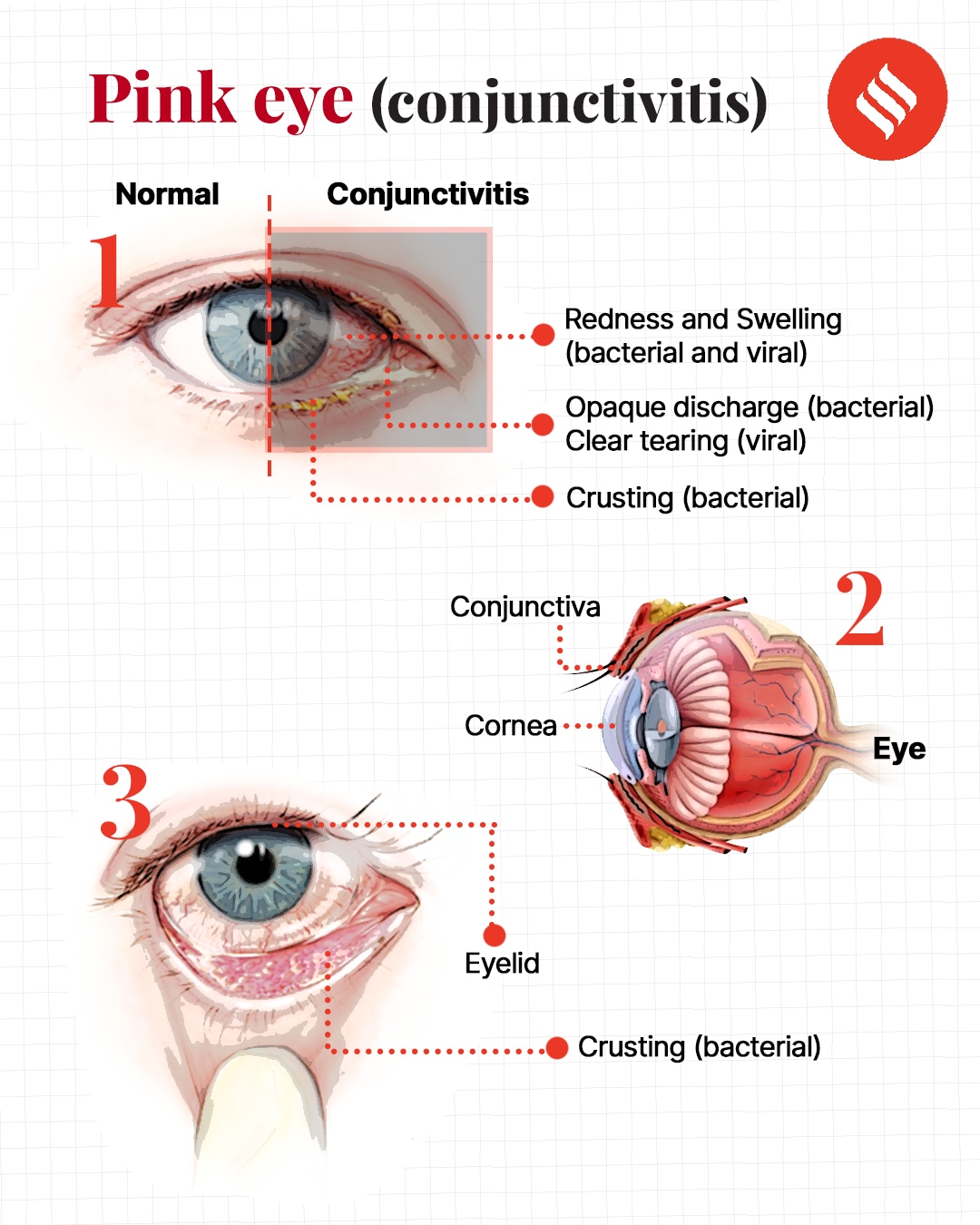
Conjunctivitis, colloquially known as eye flu, is an inflammation of the conjunctiva, the thin, transparent layer covering the white part of the eye and the inner surface of the eyelids. This condition can be caused by various factors, including viral or bacterial infections, allergens, or irritants.
Types of Conjunctivitis
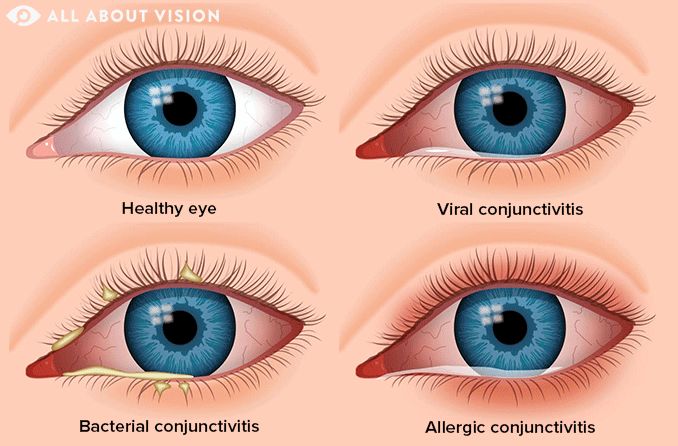
- Viral Conjunctivitis:
- Often caused by common viruses, such as the adenovirus.
- Extremely infectious and capable of transmission through direct contact with individuals who are already infected.
- Watery discharge, redness, and itching are common symptoms.
- Bacterial Conjunctivitis:
- Caused by bacteria, such as Staphylococcus or Streptococcus.
- Contagious but less so than viral conjunctivitis.
- Yellow or green discharge and eyelid crusting are typical symptoms.
- Allergic Conjunctivitis:
- Initiated by allergenic substances such as pollen, pet dander, or dust mites.
- Not contagious.
- Itchy, watery eyes and sneezing often accompany this type.
- Chemical Conjunctivitis:
- Induced by contact with irritants such as smoke, chemicals, or chlorine.
- Not contagious.
- Immediate irritation and redness occur upon exposure.
Understanding the Causes
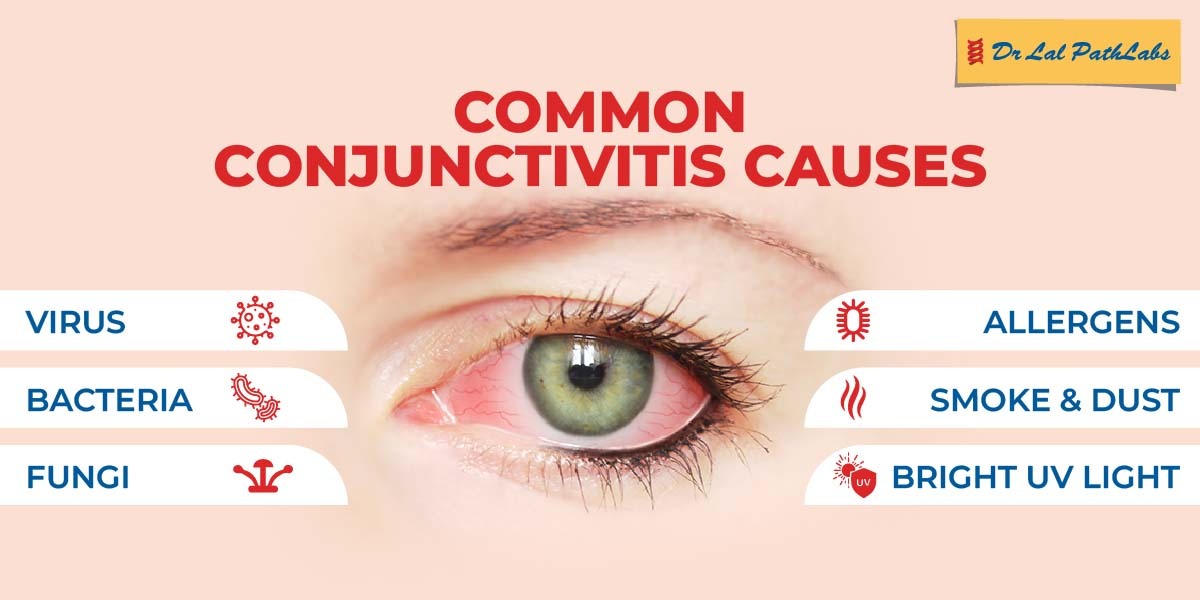
Viral Conjunctivitis: The Most Common Culprit
Viral conjunctivitis is the leading cause of eye flu. It is highly contagious and can spread through contact with infected individuals or contaminated surfaces. The adenovirus is a common viral culprit. Symptoms often include watery discharge, redness, and itching.
Bacterial Conjunctivitis: An Unwelcome Guest
Bacterial conjunctivitis is caused by bacterial infections, with Staphylococcus and Streptococcus being common offenders. While it is contagious, it is less so than viral conjunctivitis. This type is characterized by yellow or green discharge and eyelid crusting.
Allergic Conjunctivitis: When Allergies Strike
Allergic conjunctivitis occurs when the eyes react to allergens like pollen, pet dander, or dust mites. Unlike viral and bacterial conjunctivitis, this type is not contagious. It is typically associated with itchy, watery eyes and may be accompanied by sneezing.
read more about Allergies: Symptoms, Triggers, and Treatment
Chemical Conjunctivitis: Irritants at Play
Exposure to irritants like smoke, chemicals, or chlorine can lead to chemical conjunctivitis. This type is not contagious and causes immediate irritation, redness, and discomfort upon contact with the irritant.
Symptoms and Diagnosis
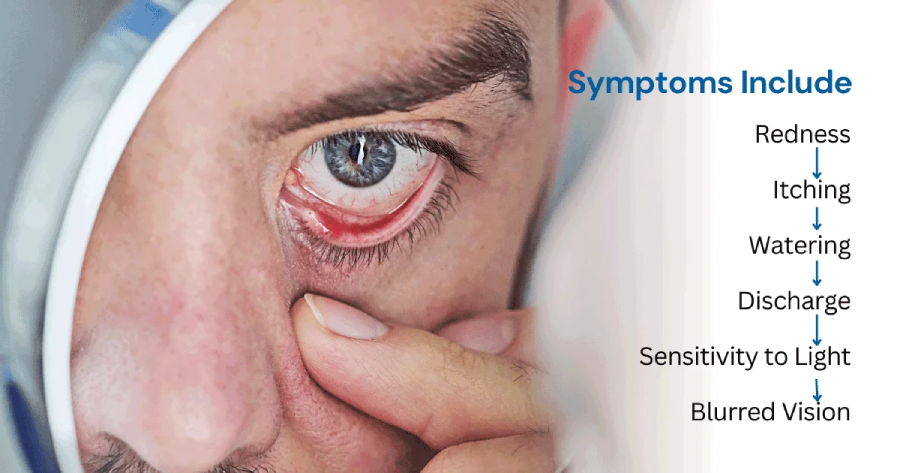
Diagnosing conjunctivitis involves a thorough examination by a healthcare professional. The following are common symptoms:
- Redness in the white part of the eye
- Excessive tearing or watery discharge
- Itching and burning sensations
- Sensitivity to light
- Swollen eyelids
- Crusty eyelashes (more common in bacterial conjunctivitis)
A healthcare provider may take a swab from the affected eye to determine the type of conjunctivitis and the appropriate treatment.
Treatment Options
Viral Conjunctivitis: Time and Rest
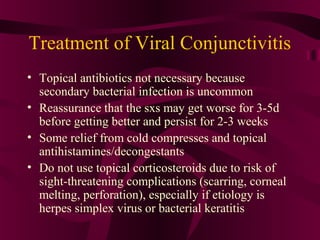
Viral conjunctivitis is typically self-limiting and tends to resolve on its own within a week or two. Treatment centers on mitigating symptoms and can encompass:
- Applying warm compresses to soothe the eyes
- Over-the-counter lubricating eye drops
- Avoiding contact lens use until the infection clears
- Practicing good hygiene to prevent spreading the virus
Bacterial Conjunctivitis: Antibiotics to the Rescue

Bacterial conjunctivitis often requires treatment with antibiotic eye drops or ointments prescribed by a healthcare provider. It’s essential to complete the entire course of antibiotics even if symptoms improve to prevent recurrence.
Allergic Conjunctivitis: Allergen Avoidance and Medications

Managing allergic conjunctivitis involves identifying and avoiding allergens that trigger symptoms. Additionally, over-the-counter or prescription antihistamine eye drops can provide relief from itching and redness.
Chemical Conjunctivitis: Rinse and Relief
For chemical conjunctivitis, promptly rinsing the eye with saline solution or clean water is crucial to remove the irritant. Artificial tears can help soothe the eye and provide relief from discomfort.
Preventive Measures

Preventing conjunctivitis, especially viral and bacterial types, involves practicing good hygiene:
- Wash your hands frequently, especially before touching your eyes.
- Avoid sharing personal items like towels, eye drops, or makeup.
- Discourage close contact with individuals who have eye infections.
- Clean and disinfect contact lenses as directed by your eye care professional.
Conclusion
Understanding the common eye flu, or conjunctivitis, is essential for managing and preventing this bothersome condition. Whether it’s caused by a virus, bacteria, allergies, or irritants, prompt recognition and appropriate treatment can alleviate symptoms and minimize the risk of spreading the infection.
For more information and expert advice on eye health, consult your healthcare provider or an ophthalmologist.
FAQs
- Is conjunctivitis contagious?
- Viral and bacterial conjunctivitis are highly contagious, while allergic and chemical conjunctivitis are not.
- How long does it take for viral conjunctivitis to clear up?
- Viral conjunctivitis typically resolves within one to two weeks.
- Can I wear contact lenses with conjunctivitis?
- It’s best to avoid wearing contact lenses until the infection clears to prevent complications.
- What should I do if I suspect my child has conjunctivitis?
- Consult a pediatrician or eye care professional for an accurate diagnosis and treatment plan.
- Are there any long-term complications of conjunctivitis?
- In most cases, conjunctivitis does not lead to long-term complications when treated promptly and appropriately.

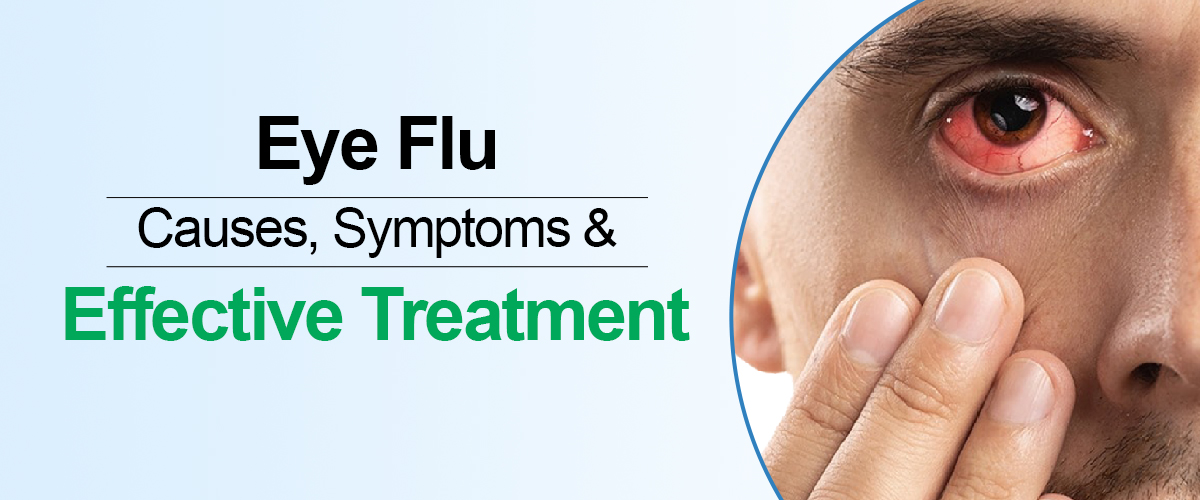








 Viesearch - The Human-curated Search Engine
Viesearch - The Human-curated Search Engine

8 Comments